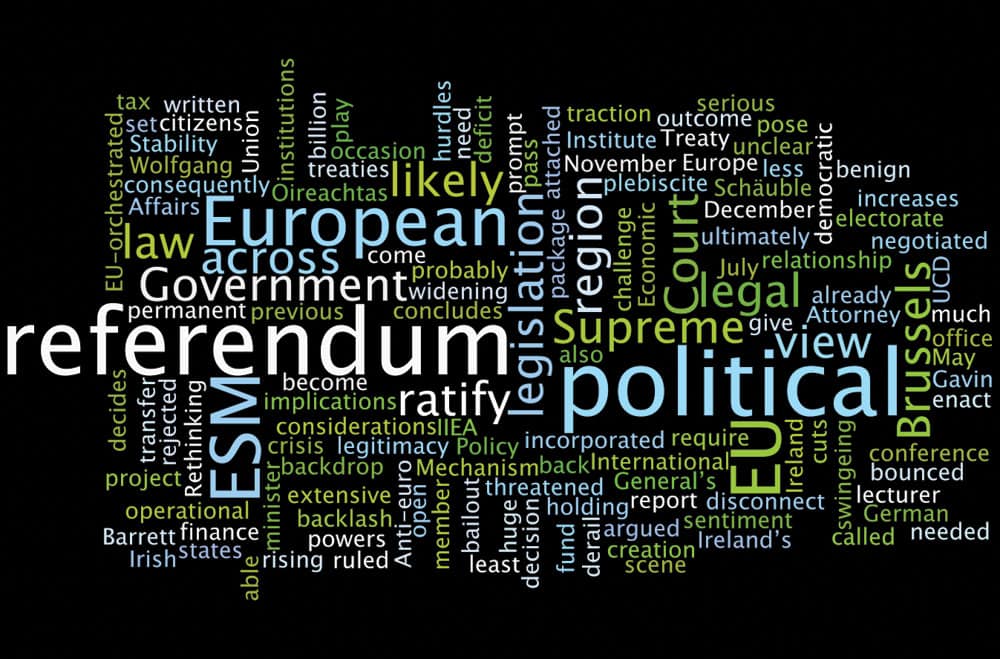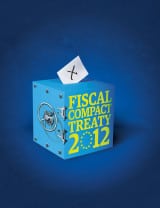John Walsh looks at whether the single currency can survive the worst crisis to hit its short life.
The 27 member states of the European Union have to ratify the creation of the permanent European Stability Mechanism (ESM) by December 2012 if the fund is to become operational by July 2013. This could pose serious political legal hurdles across the region and not least in Ireland. If it is the decision of the Attorney General’s office that the legislation does not transfer any further powers to Brussels, and consequently it does not require a referendum to pass it into law, then it is likely to prompt a political backlash.
UCD law lecturer, Gavin Barrett has written an extensive report for the Institute of International and European Affairs (IIEA). His view is that legislation needed to enact the ESM has already been incorporated in previous treaties, so it would not need a referendum on this occasion.
But that is open to a legal challenge and ultimately it could be the Supreme Court that decides the outcome, he concludes.
There are also huge political considerations. At a conference in Brussels on May 18 called Rethinking Economic Policy in Europe the German finance minister Wolfgang Schäuble said there was a crisis of political legitimacy in the EU that threatened to derail the project. He argued that there was too much of a disconnect between EU institutions and citizens across the region.
If the Supreme Court ruled that the Irish Government was able to ratify the ESM Treaty through the Oireachtas, how would that play with the electorate? Most likely it would give traction to the view that the democratic deficit is widening.
If the Government is bounced into holding a referendum, then the scene would be set for a plebiscite on Ireland’s relationship with the EU. It probably couldn’t come against a less benign backdrop. Anti-euro sentiment has been rising on the back of swingeing cuts and tax increases attached to the EU-orchestrated €85 billion bailout package negotiated in November 2010.
If the referendum is rejected, it is unclear what the implications would be.
More importantly, what would it mean for the future of the euro? The fiscal and banking crisis which has enveloped the region since 2008 has exposed serious flaws in the original architecture of European Monetary Union.
UCD lecturer Ben Tonra says that full political and fiscal union is needed for a monetary union to survive. “The German government said no to this originally. Now we can go one or two ways. We can have a hard euro with countries opting in or out and pegging new currencies to the euro. Or we can have full political and fiscal union in which people have to give up authority over these areas, and that is a very big leap.”
Schäuble was in Brussels for the inaugural Tommaso Padoa-Schioppa lecture in which he outlined his vision of the euro zone. He argued that, “we are not experiencing a crisis of the euro, but various crises in individual countries that belong to the euro area. These crises were caused by the individual countries’ erroneous fiscal and economic policies, as in the case of Greece, or … by a banking system going off the rails as in Ireland.”
Schäuble ruled out introducing a Eurobond on the basis that interest rate differentials between countries were needed to enforce market discipline and to ensure that countries lived within their means. His view was that countries carrying high levels of debt have to make the painful fiscal readjustment through deep-rooted austerity measures and structural reforms that will not only balance the national books, but will improve competitiveness.
“Recent events have shown that a common currency cannot survive without solidarity between its member states. But such solidarity can only prevent an individual country’s crisis from turning into a euro zone crisis. The only workable course is for those countries in the euro zone who are somewhat weaker, to become stronger. We can help them, but we cannot do their job. Besides, one does not resolve one’s own problems of competitiveness by asking others to become less competitive and one cannot permanently close the gap between expenditure and income by asking others for money.”
Schäuble could not have been more prescriptive: improving competitiveness was the key to ensuring that the euro zone would live up to the sum of its parts. Profligate countries had to be punished through budgetary adjustment. “The euro was not meant to be a get-rich scheme for weaker member states.” As part of the new pact designed to increase competitiveness and ensure fiscal discipline, the commission will embark on a semester programme in 2012. National governments will have to prepare budgets in consultation with the commission. Recommendations are made and if these are persistently flouted, then sanctions can be imposed on the offending member state.
In other words, there is going to be much more intrusion in the running of domestic economic and fiscal policy. One former British MEP has described it “as like having your homework done by the commission.”
Since the crisis erupted in 2008, there has been a fundamental shift in the way the EU functions. The commission, which was once the driving force of European integration has been marginalised. The irredentist Council of Ministers has emerged as the new powerbroker.
“The kind of Europe we are seeing is not the old supra-national Europe, it is now an inter-governmental Europe. Member states are acting unanimously. What we are seeing is the dance of national interests – the French on the [Irish] corporate tax rate and the Germans on the Eurobond. How often has the commission come out and said it would like a lower interest rate [on the bailout] for Ireland and it is just being ignored,” says Tonra.
The rise in the influence of the council has had huge implications for Ireland in economic governance as well, says Simon Tilford, from the London-based Centre for European Reform.
He argues that that there is very little coherency to Schäuble’s argument. “I think he [Schäuble] knows that as well.”
The German government is taking a very one-eyed view of the cause of this crisis: fiscal ill-discipline. But by far the bigger cause has been trade imbalances.
And that was caused by huge structural imbalances across the region. The German economy engineered a competitive devaluation when it joined the euro in order to pursue its export-oriented growth model. Across the board, wage freezes were introduced in the early noughties to ensure they lagged behind productivity growth. At the same time, there was a huge build-up in savings in both the corporate and domestic sectors.
This glut in savings flowed into the non-tradeable sectors, particularly housing, in the periphery countries. “I know there were enormous mistakes made in Ireland but the crisis was caused by design flaws in the euro. It is hard to know what the [Irish] Government could have done with real interest rates being negative for so long. Was it supposed to introduce capital controls,” asks Tilford.
“But who pays for this misallocation of capital? The issue was irresponsible lenders in the core, and irresponsible borrowers in the periphery. The problem is that the creditor nations are in the political driving seat and so they have successfully pushed through the initiative to dump the costs on the taxpayers in the periphery. That works politically in Germany but it does not work politically or economically in the affected countries. It is also amoral.”
Moreover, Tilford is scathing of the German government’s remedy for the euro crisis. “You cannot solve this by everybody increasing competitiveness. Otherwise the euro zone would have to keep a trade surplus with the rest of the world. And that trade surplus would have to keep rising. That is just not going to happen.”
He argues there has to be a symmetric adjustment across the euro zone. It is not possible to solve the crisis by remedial action in the deficit countries alone. There has to be reciprocal action taken in the surplus countries. Even though there has been a pick-up in German domestic consumption, there has been an anaemic commitment to liberalising many parts of the economy, particularly in services. In fact, the German Chancellor Angela Merkel has feted the Swabian housewife as the model citizen. The Swabian housewife is famed for her thriftiness.
The one thing that unites even the most ardent Europhiles and Eurosceptics is the acknowledgment that the single currency faces an existential crisis. Monetary union is not sustainable in a bloc of heterogenous economies. The larger member states say they will not countenance a break-up of the euro as this would presage the unravelling of European integration.
But what is also clear is that the euro zone cannot survive without much closer fiscal and political union. The policy stance so far has been to muddle through. Even though there has been closer union by stealth, it is not said openly. After all, there are elections in France and Germany.
Given the vigilance of the German Constitutional Court over the past few years, there is more than likely going to be a legal challenge to the ESM when the government tries to ratify it through the Bundestag. If there is a referendum in Ireland, then it promises to be much more fractious than any previous European plebiscite. At stake could be Ireland’s position in the euro zone.
The political atmosphere is such that there is very little appetite for giving away authority in political or fiscal areas. But we are in a place that is not sustainable. We either go for deeper integration or something breaks,” says Tonra.
European Stability Mechanism: A stable proposition?
The no-bailout clause in the original design of European Monetary Union was one of the main reasons the debt crisis escalated in the region. There were no contingency plans in the event a member state could not tap the markets for funding. In April 2010, as Greek bond spreads widened to unsustainable levels, euro zone member states agreed to establish a 2750bn rescue fund.
Together with a series of other measures, including the Euro-Plus-Pact, which involves much greater surveillance of member states’ budgetary and competitiveness policies, the ESM will become a permanent institution from July 13.
Possibly the biggest departure in terms of policy is that if a country has to resort to the ESM, then there will be a system in place that enables burden-sharing with investors.
German finance minister Wolfgang Schäuble and Klaus Regling, head of the European Financial Stability Facility which will meld into the ESM in 2013, both say that the ESM will only be used as a last resort measure with strict conditions attached.
But there are huge question marks hanging over the ESM. If burden-sharing comes into effect post 2013, then why would investors lend to heavily indebted countries before then?
Schäuble has dismissed this theory. He argues that the punitive bond yields for Greece, Ireland and Portugal have priced in burden-sharing in the future. “How should we interpret the signals from the market,” asked Regling at the Brussels conference “If the IMF goes into a country, then the markets do not believe that the re-adjustment process will work. If they did, then you would not need the IMF.”
But Simon Tilford from the Centre for European Reform, says the problem is with debt sustainability. “The constant refrain from Brussels and Frankfurt is why don’t the markets believe us? The answer is that markets are looking at the level of debt and the growth prospects for the affected countries in view of the policies that are being imposed upon them. They do not believe that these countries have sustainable debt positions.”





